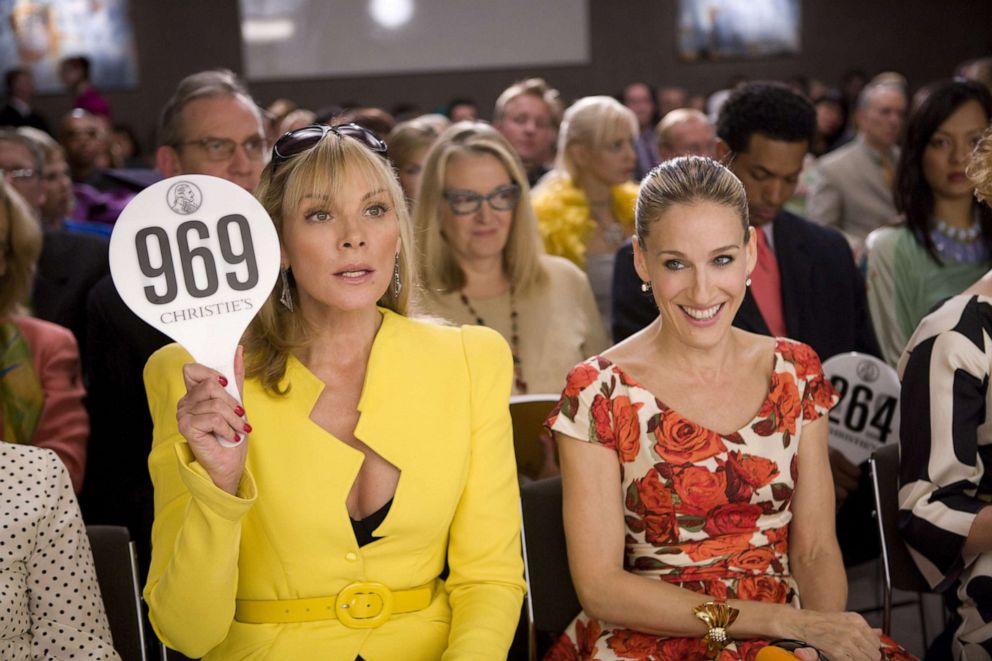Are child-free, single women really happier? An author's claim sparks debate
Paul Dolan wrote about marriage and happiness in "Happy Ever After."
All the single (and child-free) ladies put their hands up, as Beyonce would say, when an author made headlines recently with his claim that women without kids or a partner are the happiest people of all. But is that true?
"I agree," Jess Michaels, a 42-year-old author who is married but without children, told "Good Morning America." "I’m responsible for my own happiness and safety and welfare. That takes a lot of pressure off myself."
The research behind the claim came in the book "Happy Ever After" written by Paul Dolan, a professor of behavioral science at the London School of Economics.
Dolan based his findings on data he interpreted from the American Time Use Survey (ATUS), a national survey from the Bureau of Labor Statistics on how and with whom Americans spend their time.
"You’re probably better off being a man that marries than a woman who marries," Dolan told "GMA" about his findings. "Men calm down and take fewer risks when they get married. Women, essentially, they’ve got another child in the house when they get married."
Almost faster than you can say "I do," Dolan's interpretation of the ATUS data came under fire on social media after he spoke about the book during a festival in the U.K.
One economist, Gray Kimbrough, a professor at American University in Washington D.C., countered Dolan in a long Twitter thread, saying that "the evidence does support significant observed differences between married and unmarried men in terms of health, life satisfaction, and so on," and also disputed Dolan's assertion that married women die sooner.
Dolan acknowledged in his response to Kimbrough's tweets that he had misinterpreted a variable in the ATUS data. He said his editor is making a change to the book, but maintained his position that marriage is, for the most part, better for men than women.
In an interview with "GMA," Dolan said the larger idea he puts forward in the book is that women in particular can lead non-traditional lives and still be happy.
"If I’ve kind of emboldened people to make different life choices — and not just women who don’t marry or have kids — if I’ve enabled them to be more liberated, then that’s fantastic," he said. "I’m not making any prescription about how anyone lives their life, just suggesting that people may want to live differently than what’s expected."
Dolan said he got a large round of applause at the U.K. festival where he first spoke about his findings. He believes interest in the topic is so high because it challenges the societal norms that expect women to marry and have kids.
"The world is a complicated place and we like institutions and order and marriage gives us that order," he said. "If single women may not be as miserable as we think them to be, that calls into question the orders and we don’t like that being challenged"
Dolans' book comes at a time when women are getting married later in life, if at all, and more women are choosing to be childless. The fertility rate in the U.S. has been steadily declining, with 60.3 births per 1,000 women aged 15 to 44 in 2017, according to the most recent data from the Centers for Disease Control and Prevention.
Women without kids can also be seen thriving in American life — Oprah Winfrey and Jennifer Aniston — and in pop culture, such as Kim Cattrall and Sarah Jessica Parker's characters on "Sex and the City."

#ChildFree and #ChildFreeByChoice are even their own hashtags on social media.
"I definitely think I’m happier than I would have been," said Michaels. "I’ve taken more chances and gotten to do more in terms of travel and career. I don’t think I would have done those things if I’d had children to consider."
Amy Blackstone, a sociology professor at the University of Maine, has studied the child-free movement for the past decade. She too is a married woman who has chosen not to have kids.
When she first set out to find data on women who are child-free, she discovered there was very little.
"I thought I would find a lot of research about women like me but I didn't," she said. "We need to pick this question up because we still don’t understand the lived experiences of women without children."
Blackstone started a blog about being child-free and wrote a new book about her research, too, called "Childfree by Choice: The Movement Redefining Family and Creating a New Age of Independence."
"There’s very little scientific evidence to show that women have a maternal drive to have children," Blackstone said. "That was a big a-ha moment for me."
"What we tell ourselves and rear girls in is that when they grow up, their biological clock will start ticking and maternal instinct will kick in and they’ll be happy," she added. "Yes there is a thing that kicks in once women have given birth that drives them to nurture their children, but we’re really driven to have sex, not motherhood."
Blackstone pointed out that an important distinction in her research is the difference between women who choose to be child-free and women who want to have children but are unable to due to a variety of circumstances.
For women who choose not to have children, the stereotypes that they are selfish and self-involved are just not true, both Blackstone and Dolan found.
"From the women I interviewed, many of them are deeply involved in their communities," said Blackstone. "What I found is they opt to use their time being very involved in their communities and are more likely to organize an event rather than simply attend an event, for example."
Dolan noted that for single women and women without kids, the strength of their community outside their immediate families — or their social networks — is the main reason they report high levels of happiness.
"Often, the narrative is that women who choose not to have children are selfish, but how selfish is it to have children if you’re creating an image of yourself and then you’re sharing it with everyone," Dolan said. "I'm making the non-controversial claim in my book that the evidence can be interpreted with huge variations across individuals so we should perhaps just let people get on and live their own lives."






